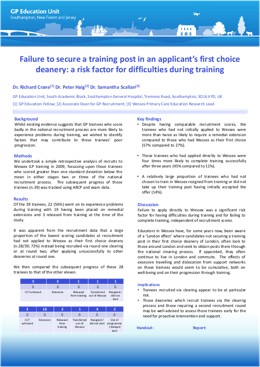Failure to Secure a Training Post in an Applicants First Choice Deanery as a Risk Factor for Difficulties During Training
Dr Richard Crane, Dr Peter Haig, Dr Samantha Scallan
Background
Trainees in difficulty present an increasing challenge. Recent emphasis has shifted from remedial activity to early identification of those at risk, combined with proactive intervention. Low recruitment scores have been associated with increased risk of difficulties.
We examined this group more closely to identify other risk factors.
Summary of Work
We identified 39 trainees who scored poorly in the UK national GP recruitment process. It was immediately obvious that a large proportion of these trainees (28) had not chosen to train in Wessex, having come to the deanery through the clearing process or recruitment round two. We then compared their outcomes with the 11 low-scorers who had applied directly to Wessex.
Findings
Every trainee recruited via clearing fell into the cohort of 39. The mean recruitment scores of the clearing group were not significantly different to those of the low-scorers who applied directly to Wessex. Clearing recruits were four times less likely to finish their training after three years, twice as likely to receive a training extension and more likely to resign or be released from training.
Conclusions
Accepting a training post in a deanery other than those applied to is a risk factor for difficulties during training, independently of a low recruitment score. These trainees are more likely to resign or fail to complete training than a trainee who did apply to Wessex. Clearing recruits are a high risk group who should be considered for intervention early. Clearing recruits may be social isolated or commuting long distances and may benefit from additional pastoral support.

Publications
| Publication | Year | DOI | Link | |
|---|---|---|---|---|
| Education for Primary Care: Failure to Secure a Training Post in an Applicant’s First Choice Deanery: A Significant Risk Factor for Difficulties During Training | 10.1080/14739879.2013.11494202 | http://www.tandfonline.com/doi/abs/10.1080/14739879.2013.11494202 | Download file |
Conferences
| Title | Type |
|---|---|
| AMEE Conference 2013 | Poster presentation |
| DEMEC 2015 | Poster presentation |
| RCGP Conference 2013 | Poster presentation |
Related events, research and information
Having Problems?
23 March 2016 – Having Problems? Your first port of call if you are having difficulties should be your clinical or educational...
Workforce Planning: First5 Career Intentions on Place and Extent of Work
17 August 2016 – Background Research demonstrates that Newly Qualified General Practitioners (NQGPs) have different career...
Value-Added Day Release Course
17 August 2016 – Background The introduction of the nMRCGP, and in particular the CSA (Clinical Skills Assessment) component,...
Mind the Gap: Using EBL as a Platform for Transition in General Practice Training
17 August 2016 – Background General Practice (GP) trainees in their first two years of training attend monthly educational...
ST1/2
5 May 2016 – Structure of the Vocational Training Scheme (VTS) Your first two years of General Practice training in...
GP Trainers
20 October 2015 – Being a GP Trainer is stimulating, interesting and rewarding. If you would like to become a GP Trainer please...
MRCGP
25 May 2016 – The MRCGP is required by GP Trainees to gain Certificate of Completion of Training in General Practice (CCT)....
ST3
23 March 2016 – ST3 Teaching Sessions The ST3 teaching course provides educational sessions for ST3 Trainees. It is based at...
International Medical Graduate (IMG)
15 June 2022 – International Medical Graduate GP trainees. This page has links to useful information and resources we hope...
